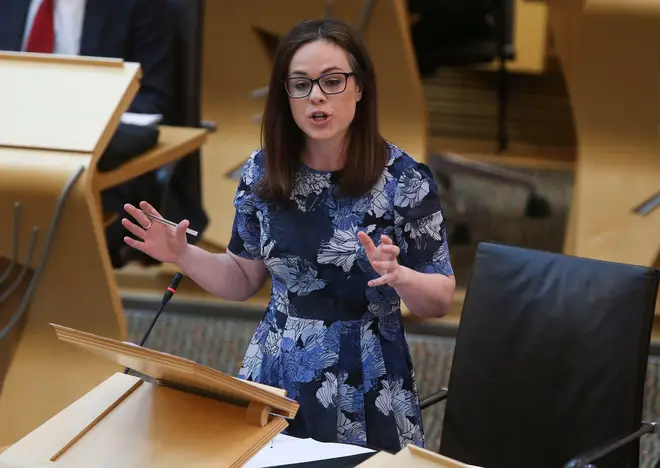
Clive Bull 1am - 4am
23 March 2022, 19:09

Scotland's finance secretary Kate Forbes has claimed Rishi Sunak's spring statement will plunge hundreds of thousands of Scots into fuel poverty, and accused him of driving a wedge between the lowest and highest earners in the UK.
Reacting to the Chancellor's budget, she said it did nothing to tackle the cost of living crisis, and dismissed the proposed future income tax cut saying: "families don't need help in 2024, they need help now".
She also rejected suggestions that the Scottish Government was failing to help the poorest in Scotland and said she had gone a "lot further than the UK government".
Speaking in Holyrood to LBC she said: "The spring statement has failed to address the biggest challenges facing households today. With soaring energy bills and a cost of living crisis, the Chancellor has not used his statement sufficiently to provide lifeline support that could prevent households facing fuel poverty.
"It does nothing to prevent 400,000 Scots being plunged into, or deeper into, fuel poverty."
On the decision to raise thresholds for National Insurance, she said "any support for those hardest pressed is to be welcomed" but added: "This is a situation the Chancellor has made himself - he has ironically decided to cut income tax in a few years time and hike National Insurance at the moment driving a wedge between the poorest paid and highest paid in our country - something doesn't stack up.
"Ultimately what families need right now is help with their energy bills, with rising costs of living, with the fact that many are facing choices over how to spend limited funds at a time when inflation is soaring too.
"The Chancellor is talking about changes to income tax in a few years time based on a number of caveats - and we'll see if those come true. But families don't need help in 2024, they need help now."
Income tax is devolved to the Scottish Government, but Ms Forbes refused to say if she would match the Chancellor's pledge. "We look in advance of every budget at our tax policies and we will take the appropriate action that needs to be taken."
She also said the Scottish Government had done more than the UK government in trying to help families tackle the cost of living crisis.
"We had a limited amount of funding we mobilised it for those families in receipt of council tax reduction across all council tax bands, we also put funding into the fuel security fund, which helps those most at risk of self disconnection or rationing their energy, so that's what we've done on top of increasing the Scottish Welfare Fund, doubling the Scottish Child Payment - that's a comprehensive package of support.
"But in a year which has seen the fastest fall in living standards and energy bills soaring - ultimately control over benefits and energy are reserved so our hands will always be tied."
Asked about the £45m coming to Scotland in Barnett consequentials as a result of the Chancellor's statement and how it would be spent, she said she was still yet to see the details.
"But we've already have demonstrated our willingness and ability to mobilise funding quickly - these are the steps we should have been seeing the Chancellor take today - the steps you would expect a government presiding over the fastest drop in living standards since the 1950s, these are the steps you'd expect them to take, but we didn't see that today."
Scottish Labour leader Anas Sarwar agreed with Ms Forbes that the Chancellor had done little to "end the choice between heating and eating for those making impossible choices".
Christine Jardine, Liberal Democrat Treasury spokeswoman, added: "Families were looking to the Chancellor to offer them hope, instead he is adding to their pain by refusing to scrap his unfair tax rises. People seeing the biggest plunge in living standards in fifty years will see through the Chancellor’s spin."
However Secretary of State for Scotland Alister Jack backed his Cabinet colleague and said Scotland would benefit hugely from the Chancellor's statement.
He said: "There's the extra money for the Scottish Government and they can use that for a household support scheme if they so choose to, there's the cut in National Insurance, the cut in fuel duty, the Universal Credit taper rate which will improve household incomes by between £500 and £1000 a year for the lowest paid, and the increase in the national living wage to £9.50 so there are a lot of things in the basket which will help people with the cost of living."
Scottish Conservative finance spokeswoman Liz Smith added: "Rishi Sunak has delivered a welcome package of support that will play a vital role in keeping the cost of living down.
"It’s particularly welcome that the basic rate of income tax will be cut by 2024. The SNP must now agree to match Rishi Sunak’s announcement, which will put more money in the pocket of every single taxpayer."